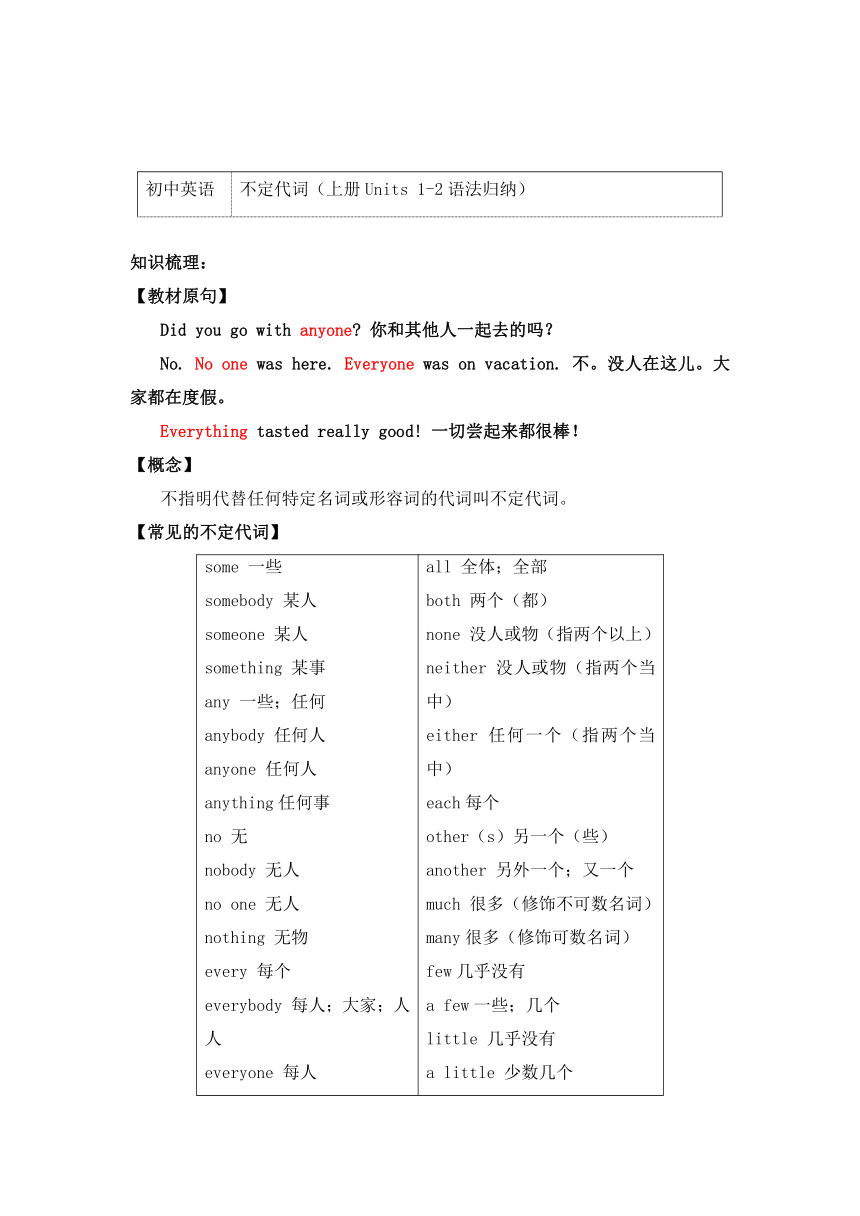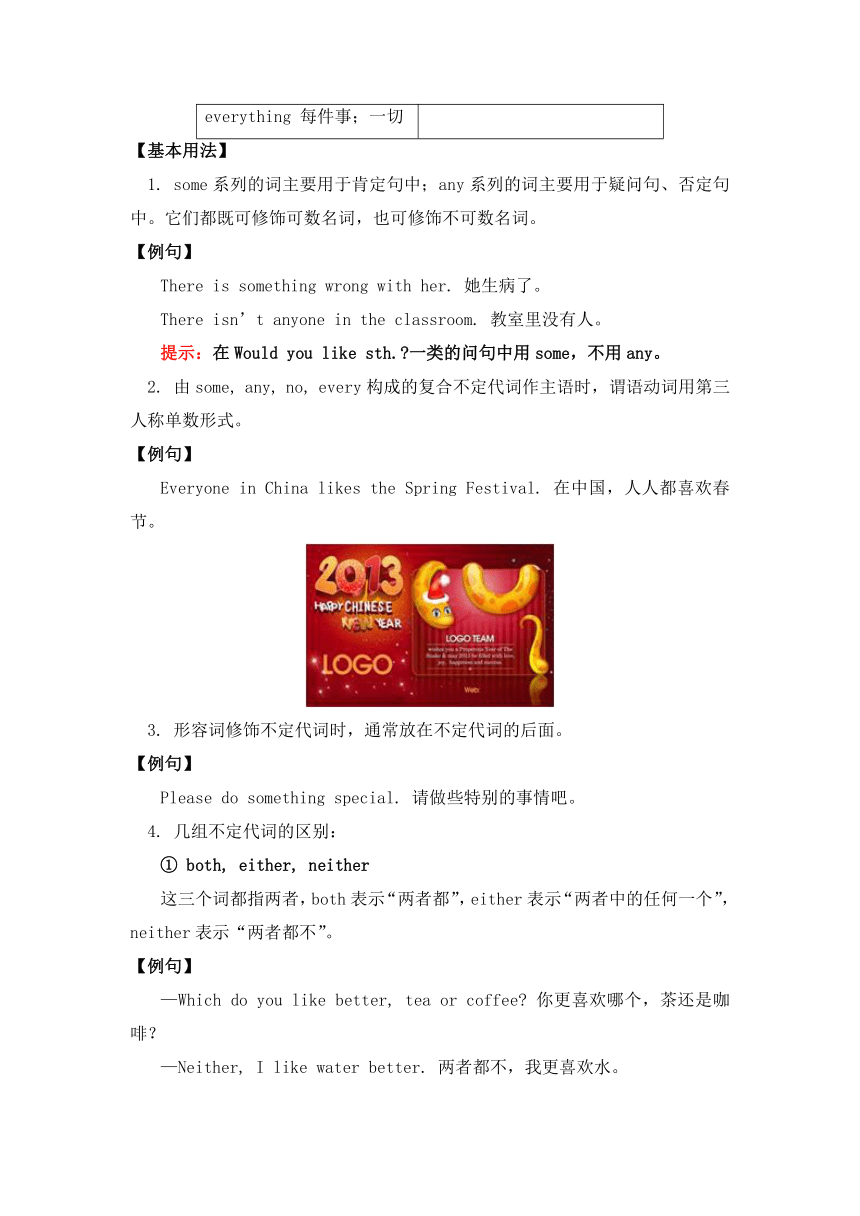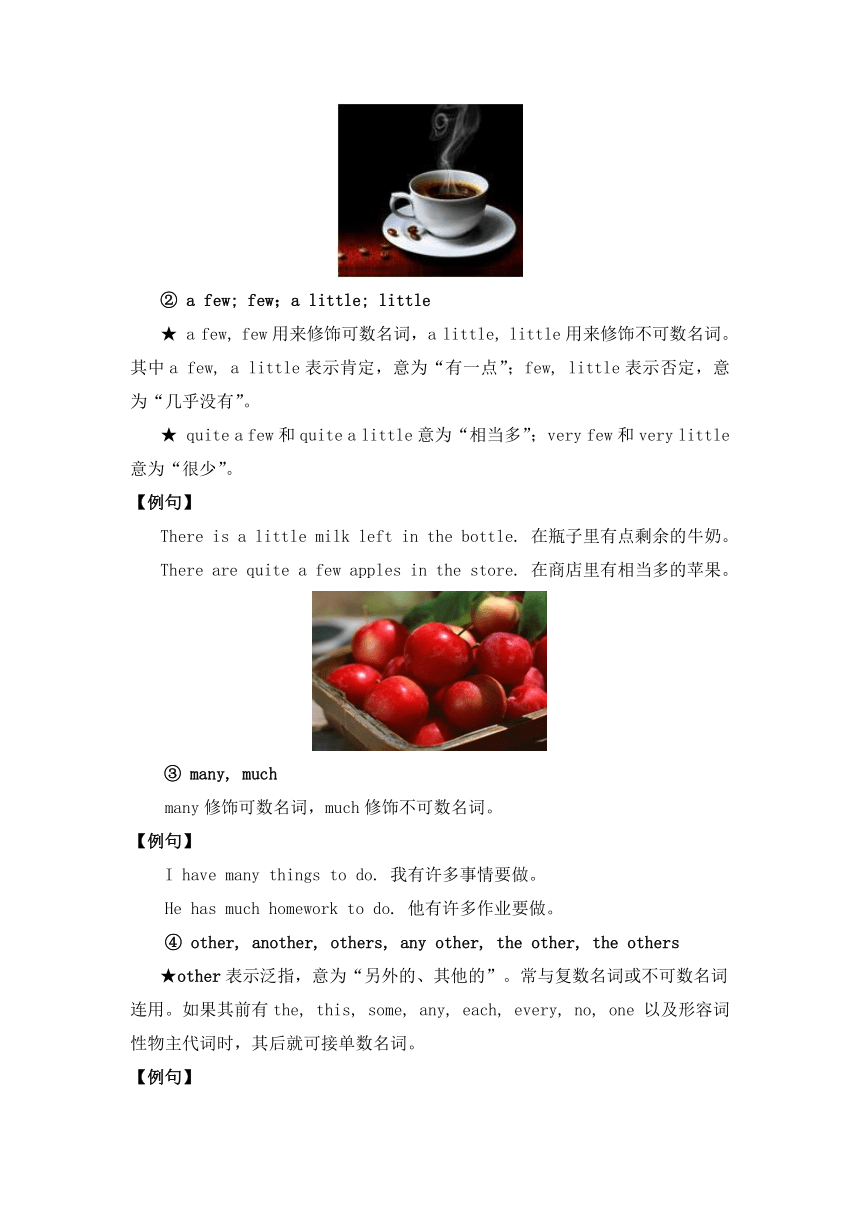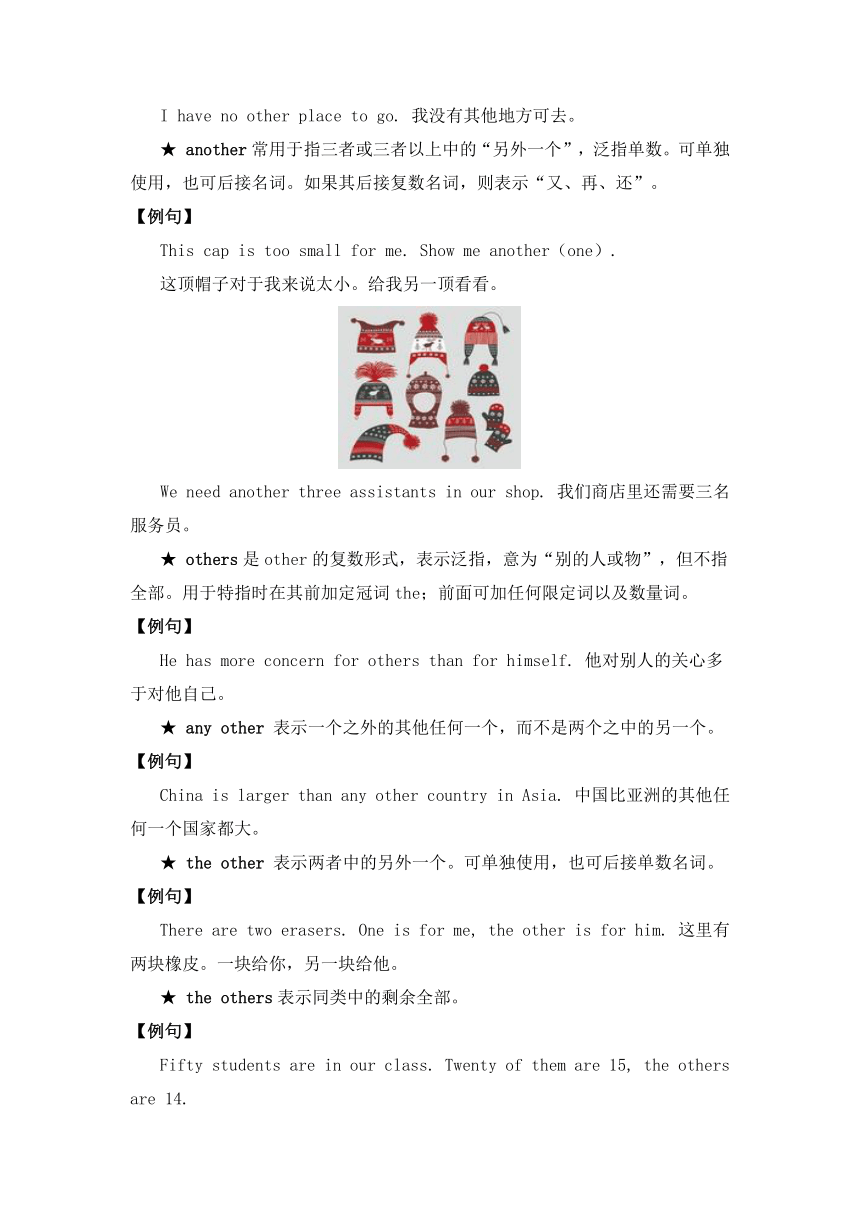人教新目标版英语八年级上册知识讲义 不定代词(Units 1-2语法归纳)
文档属性
| 名称 | 人教新目标版英语八年级上册知识讲义 不定代词(Units 1-2语法归纳) |

|
|
| 格式 | doc | ||
| 文件大小 | 205.0KB | ||
| 资源类型 | 教案 | ||
| 版本资源 | 人教新目标(Go for it)版 | ||
| 科目 | 英语 | ||
| 更新时间 | 2020-09-11 15:10:09 | ||
图片预览




文档简介
初中英语 不定代词(上册Units 1-2语法归纳)
知识梳理:
【教材原句】
Did you go with anyone? 你和其他人一起去的吗?
No. No one was here. Everyone was on vacation. 不。没人在这儿。大家都在度假。
Everything tasted really good! 一切尝起来都很棒!
【概念】
不指明代替任何特定名词或形容词的代词叫不定代词。
【常见的不定代词】
some 一些 somebody 某人
someone 某人
something 某事
any 一些;任何
anybody 任何人
anyone 任何人
anything任何事
no 无
nobody 无人
no one 无人
nothing 无物
every 每个
everybody 每人;大家;人人
everyone 每人
everything 每件事;一切 all 全体;全部
both 两个(都)
none 没人或物(指两个以上)
neither 没人或物(指两个当中)
either 任何一个(指两个当中)
each每个
other(s)另一个(些)
another 另外一个;又一个
much 很多(修饰不可数名词)
many很多(修饰可数名词)
few几乎没有
a few一些;几个
little 几乎没有
a little 少数几个
【基本用法】
1. some系列的词主要用于肯定句中;any系列的词主要用于疑问句、否定句中。它们都既可修饰可数名词,也可修饰不可数名词。
【例句】
There is something wrong with her. 她生病了。
There isn’t anyone in the classroom. 教室里没有人。
提示:在Would you like sth.?一类的问句中用some,不用any。
2. 由some, any, no, every构成的复合不定代词作主语时,谓语动词用第三人称单数形式。
【例句】
Everyone in China likes the Spring Festival. 在中国,人人都喜欢春节。
3. 形容词修饰不定代词时,通常放在不定代词的后面。
【例句】
Please do something special. 请做些特别的事情吧。
4. 几组不定代词的区别:
① both, either, neither
这三个词都指两者,both表示“两者都”,either表示“两者中的任何一个”,neither表示“两者都不”。
【例句】
—Which do you like better, tea or coffee? 你更喜欢哪个,茶还是咖啡?
—Neither, I like water better. 两者都不,我更喜欢水。
② a few; few;a little; little
★ a few, few用来修饰可数名词,a little, little用来修饰不可数名词。其中a few, a little表示肯定,意为“有一点”;few, little表示否定,意为“几乎没有”。
★ quite a few和quite a little意为“相当多”;very few和very little意为“很少”。
【例句】
There is a little milk left in the bottle. 在瓶子里有点剩余的牛奶。
There are quite a few apples in the store. 在商店里有相当多的苹果。
③ many, much
many修饰可数名词,much修饰不可数名词。
【例句】
I have many things to do. 我有许多事情要做。
He has much homework to do. 他有许多作业要做。
④ other, another, others, any other, the other, the others
★other表示泛指,意为“另外的、其他的”。常与复数名词或不可数名词连用。如果其前有the, this, some, any, each, every, no, one 以及形容词性物主代词时,其后就可接单数名词。
【例句】
I have no other place to go. 我没有其他地方可去。
★ another常用于指三者或三者以上中的“另外一个”,泛指单数。可单独使用,也可后接名词。如果其后接复数名词,则表示“又、再、还”。
【例句】
This cap is too small for me. Show me another(one).
这顶帽子对于我来说太小。给我另一顶看看。
We need another three assistants in our shop. 我们商店里还需要三名服务员。
★ others是other的复数形式,表示泛指,意为“别的人或物”,但不指全部。用于特指时在其前加定冠词the;前面可加任何限定词以及数量词。
【例句】
He has more concern for others than for himself. 他对别人的关心多于对他自己。
★ any other 表示一个之外的其他任何一个,而不是两个之中的另一个。
【例句】
China is larger than any other country in Asia. 中国比亚洲的其他任何一个国家都大。
★ the other 表示两者中的另外一个。可单独使用,也可后接单数名词。
【例句】
There are two erasers. One is for me, the other is for him. 这里有两块橡皮。一块给你,另一块给他。
★ the others表示同类中的剩余全部。
【例句】
Fifty students are in our class. Twenty of them are 15, the others are 14.
我们班有五十名学生。二十名15岁,剩余的都是14岁。
⑤ neither, none
neither 表示“两者都不”,反义词是both“两者都”。neither of引导主语时谓语动词用单数形式。 Neither of them is interested in math. 他们两个都对数学不感兴趣。
none 表示“三者或三者以上都不”,反义词是all,表示“三者或三者以上全都”,none of引导主语时谓语动词用单、复数形式都行。 None of them is/ are excited about the news.
听到这个消息他们谁也不感到振奋。
⑥ no one, none, nobody
都表示否定意义。none后可跟of短语,no one 和nobody则不能;none 既可指人,又可指物;nobody和no one只能指人。
【例句】
Nobody/ No one believed his story. 没有人相信他的故事。
None of us believed his story. 我们没人相信他的故事。
none用来回答how many或how much提问的特殊疑问句,no one 和nobody用来回答who提问的特殊疑问句。
【例句】
—How many dogs do you keep? 你养了多少条狗?
—None. 一条也没养。
—Who was late? 谁迟到了?
—No one. / Nobody. 谁也没迟到。
【考题链接】
—Who helped you finish the work?
—___________________. I finished it by myself.
A. None B. No one C. Neither D. All
答案:B
思路分析:根据答语“我自己完成的”可知“没有人帮助我”,故选B项。no one 和nobody用来回答who提问的特殊疑问句。
即学即练:
单项选择
1. There must be ____________wrong with the clock. It doesn’t work.
A. nothing B. something C. everything D. anything
答案:B
思路分析:根据“它不工作了”可知“这块表肯定出了毛病”,故选B项。
2. Ms. Wang is an excellent teacher. ______________ in our class loves her.
A. Someone B. No one C. Everyone D. Anyone
答案:C
思路分析:由句意“王老师是一名优秀教师”可知“我们班的每个人都喜欢她”,故选C项。
3. Mrs. Brown is nice. Every day she tried to cook _________________________for me during my stay in Canada.
A. something different B. anything different
C. nothing different D. everything different
答案:A
思路分析:根据句意“布朗夫人很好”可知“在我呆在加拿大时,她每天都尽力给我做不同的东西吃”,故选A项。
4. —We have red and yellow T-shirts. Which color do you like?
—I’m afraid ______________. I think blue will be OK.
A. both B. either C. neither D. none
答案:C
思路分析:根据答语“我认为蓝色不错”可知既不喜欢红色也不喜欢黄色,故选C项。A项意为“两者都”;B项意为“两者中的每一个”;C项意为“两者都不”;D项意为“三者或三者以上中都不”。
5. —How many birds can you see in the tree?
— . All the birds have flown away.
A. None B. No one C. Nothing D. A few
答案:A
思路分析:根据答语“所有的鸟都飞了”可知“一只也没有”;问句是以how many引导的,应用none回答。故选A项。
专项练习:
(答题时间:20分钟)
I. 选词填空
1. You must do carefully. (something, everything)
2. Granny Liu has rice now. Let’s buy _______________ for her. (little, a little, some)
3. I am off duty today. Give me to read. (everything, something)
4. They all came to the playground for morning exercises. of them were late. (neither, none)
5. My sister gave me two pictures. One is the Great Wall, is the Ming Tombs. (another, other, the other)
6. He asked for money and I gave him . (some, any)
7. Did you eat at supper time? (much, many)
8. If calls, tell him I am busy. (anyone, someone)
9. Is ___________________ here today? (everyone; someone)
II. 根据汉语意思完成下列句子
1. 太阳总是从东方升起。
The sun ______________________ rises in the east.
2. 我弟弟从不努力学习。
My brother ___________________ studies hard.
3. 吉姆通常十二点睡觉。
Jim ____________________ goes to bed at about 12.
4. 林涛家里经常有客人。
_____________________there were visitors in Lin Tao’s home.
5. 有时我们去图书馆,有时我们去散步。
_____________________we go to the library and at other times we go for a walk.
6. 我以前从来没有见过这样的人。
I have __________________ met such a man before.
7. 他们通常不在星期一到阅览室去。
They don’t __________________ go to the reading room on Monday.
8. 他总是想到别人。
He is ___________________ thinking of others.
答案:
I. 1. everything 2. little; some 3. something 4. None 5. the other 6. some
7. much 8. anyone 9. everyone
II. 1. always 2. never 3. usually 4. Often 5. Sometimes 6. never 7. usually 8. always
知识梳理:
【教材原句】
Did you go with anyone? 你和其他人一起去的吗?
No. No one was here. Everyone was on vacation. 不。没人在这儿。大家都在度假。
Everything tasted really good! 一切尝起来都很棒!
【概念】
不指明代替任何特定名词或形容词的代词叫不定代词。
【常见的不定代词】
some 一些 somebody 某人
someone 某人
something 某事
any 一些;任何
anybody 任何人
anyone 任何人
anything任何事
no 无
nobody 无人
no one 无人
nothing 无物
every 每个
everybody 每人;大家;人人
everyone 每人
everything 每件事;一切 all 全体;全部
both 两个(都)
none 没人或物(指两个以上)
neither 没人或物(指两个当中)
either 任何一个(指两个当中)
each每个
other(s)另一个(些)
another 另外一个;又一个
much 很多(修饰不可数名词)
many很多(修饰可数名词)
few几乎没有
a few一些;几个
little 几乎没有
a little 少数几个
【基本用法】
1. some系列的词主要用于肯定句中;any系列的词主要用于疑问句、否定句中。它们都既可修饰可数名词,也可修饰不可数名词。
【例句】
There is something wrong with her. 她生病了。
There isn’t anyone in the classroom. 教室里没有人。
提示:在Would you like sth.?一类的问句中用some,不用any。
2. 由some, any, no, every构成的复合不定代词作主语时,谓语动词用第三人称单数形式。
【例句】
Everyone in China likes the Spring Festival. 在中国,人人都喜欢春节。
3. 形容词修饰不定代词时,通常放在不定代词的后面。
【例句】
Please do something special. 请做些特别的事情吧。
4. 几组不定代词的区别:
① both, either, neither
这三个词都指两者,both表示“两者都”,either表示“两者中的任何一个”,neither表示“两者都不”。
【例句】
—Which do you like better, tea or coffee? 你更喜欢哪个,茶还是咖啡?
—Neither, I like water better. 两者都不,我更喜欢水。
② a few; few;a little; little
★ a few, few用来修饰可数名词,a little, little用来修饰不可数名词。其中a few, a little表示肯定,意为“有一点”;few, little表示否定,意为“几乎没有”。
★ quite a few和quite a little意为“相当多”;very few和very little意为“很少”。
【例句】
There is a little milk left in the bottle. 在瓶子里有点剩余的牛奶。
There are quite a few apples in the store. 在商店里有相当多的苹果。
③ many, much
many修饰可数名词,much修饰不可数名词。
【例句】
I have many things to do. 我有许多事情要做。
He has much homework to do. 他有许多作业要做。
④ other, another, others, any other, the other, the others
★other表示泛指,意为“另外的、其他的”。常与复数名词或不可数名词连用。如果其前有the, this, some, any, each, every, no, one 以及形容词性物主代词时,其后就可接单数名词。
【例句】
I have no other place to go. 我没有其他地方可去。
★ another常用于指三者或三者以上中的“另外一个”,泛指单数。可单独使用,也可后接名词。如果其后接复数名词,则表示“又、再、还”。
【例句】
This cap is too small for me. Show me another(one).
这顶帽子对于我来说太小。给我另一顶看看。
We need another three assistants in our shop. 我们商店里还需要三名服务员。
★ others是other的复数形式,表示泛指,意为“别的人或物”,但不指全部。用于特指时在其前加定冠词the;前面可加任何限定词以及数量词。
【例句】
He has more concern for others than for himself. 他对别人的关心多于对他自己。
★ any other 表示一个之外的其他任何一个,而不是两个之中的另一个。
【例句】
China is larger than any other country in Asia. 中国比亚洲的其他任何一个国家都大。
★ the other 表示两者中的另外一个。可单独使用,也可后接单数名词。
【例句】
There are two erasers. One is for me, the other is for him. 这里有两块橡皮。一块给你,另一块给他。
★ the others表示同类中的剩余全部。
【例句】
Fifty students are in our class. Twenty of them are 15, the others are 14.
我们班有五十名学生。二十名15岁,剩余的都是14岁。
⑤ neither, none
neither 表示“两者都不”,反义词是both“两者都”。neither of引导主语时谓语动词用单数形式。 Neither of them is interested in math. 他们两个都对数学不感兴趣。
none 表示“三者或三者以上都不”,反义词是all,表示“三者或三者以上全都”,none of引导主语时谓语动词用单、复数形式都行。 None of them is/ are excited about the news.
听到这个消息他们谁也不感到振奋。
⑥ no one, none, nobody
都表示否定意义。none后可跟of短语,no one 和nobody则不能;none 既可指人,又可指物;nobody和no one只能指人。
【例句】
Nobody/ No one believed his story. 没有人相信他的故事。
None of us believed his story. 我们没人相信他的故事。
none用来回答how many或how much提问的特殊疑问句,no one 和nobody用来回答who提问的特殊疑问句。
【例句】
—How many dogs do you keep? 你养了多少条狗?
—None. 一条也没养。
—Who was late? 谁迟到了?
—No one. / Nobody. 谁也没迟到。
【考题链接】
—Who helped you finish the work?
—___________________. I finished it by myself.
A. None B. No one C. Neither D. All
答案:B
思路分析:根据答语“我自己完成的”可知“没有人帮助我”,故选B项。no one 和nobody用来回答who提问的特殊疑问句。
即学即练:
单项选择
1. There must be ____________wrong with the clock. It doesn’t work.
A. nothing B. something C. everything D. anything
答案:B
思路分析:根据“它不工作了”可知“这块表肯定出了毛病”,故选B项。
2. Ms. Wang is an excellent teacher. ______________ in our class loves her.
A. Someone B. No one C. Everyone D. Anyone
答案:C
思路分析:由句意“王老师是一名优秀教师”可知“我们班的每个人都喜欢她”,故选C项。
3. Mrs. Brown is nice. Every day she tried to cook _________________________for me during my stay in Canada.
A. something different B. anything different
C. nothing different D. everything different
答案:A
思路分析:根据句意“布朗夫人很好”可知“在我呆在加拿大时,她每天都尽力给我做不同的东西吃”,故选A项。
4. —We have red and yellow T-shirts. Which color do you like?
—I’m afraid ______________. I think blue will be OK.
A. both B. either C. neither D. none
答案:C
思路分析:根据答语“我认为蓝色不错”可知既不喜欢红色也不喜欢黄色,故选C项。A项意为“两者都”;B项意为“两者中的每一个”;C项意为“两者都不”;D项意为“三者或三者以上中都不”。
5. —How many birds can you see in the tree?
— . All the birds have flown away.
A. None B. No one C. Nothing D. A few
答案:A
思路分析:根据答语“所有的鸟都飞了”可知“一只也没有”;问句是以how many引导的,应用none回答。故选A项。
专项练习:
(答题时间:20分钟)
I. 选词填空
1. You must do carefully. (something, everything)
2. Granny Liu has rice now. Let’s buy _______________ for her. (little, a little, some)
3. I am off duty today. Give me to read. (everything, something)
4. They all came to the playground for morning exercises. of them were late. (neither, none)
5. My sister gave me two pictures. One is the Great Wall, is the Ming Tombs. (another, other, the other)
6. He asked for money and I gave him . (some, any)
7. Did you eat at supper time? (much, many)
8. If calls, tell him I am busy. (anyone, someone)
9. Is ___________________ here today? (everyone; someone)
II. 根据汉语意思完成下列句子
1. 太阳总是从东方升起。
The sun ______________________ rises in the east.
2. 我弟弟从不努力学习。
My brother ___________________ studies hard.
3. 吉姆通常十二点睡觉。
Jim ____________________ goes to bed at about 12.
4. 林涛家里经常有客人。
_____________________there were visitors in Lin Tao’s home.
5. 有时我们去图书馆,有时我们去散步。
_____________________we go to the library and at other times we go for a walk.
6. 我以前从来没有见过这样的人。
I have __________________ met such a man before.
7. 他们通常不在星期一到阅览室去。
They don’t __________________ go to the reading room on Monday.
8. 他总是想到别人。
He is ___________________ thinking of others.
答案:
I. 1. everything 2. little; some 3. something 4. None 5. the other 6. some
7. much 8. anyone 9. everyone
II. 1. always 2. never 3. usually 4. Often 5. Sometimes 6. never 7. usually 8. always
同课章节目录
- Unit 1 Where did you go on vacation?
- Section A
- Section B
- Unit 2 How often do you exercise?
- Section A
- Section B
- Unit 3 I'm more outgoing than my sister.
- Section A
- Section B
- Unit 4 What's the best movie theater?
- Section A
- Section B
- Unit 5 Do you want to watch a game show?
- Section A
- Section B
- Unit 6 I'm going to study computer science.
- Section A
- Section B
- Unit 7 Will people have robots?
- Section A
- Section B
- Unit 8 How do you make a banana milk shake?
- Section A
- Section B
- Unit 9 Can you come to my party?
- Section A
- Section B
- Unit 10 If you go to the party, you'll have a grea
- Section A
- Section B
